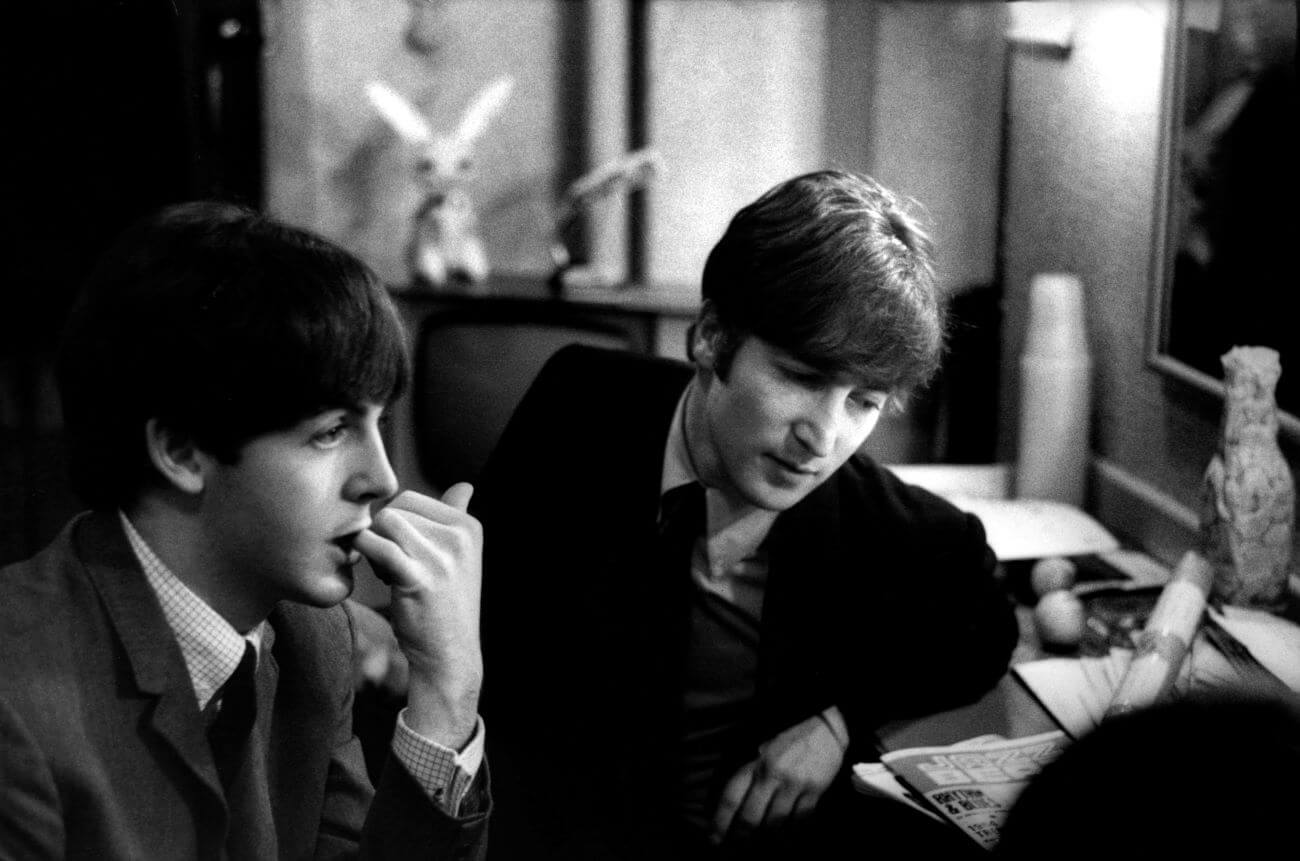
John Lennon Liked the Lennon-McCartney Songwriting Credit Because of His ‘Insecurity,’ Claimed His Longtime Friend
The Lennon-McCartney songwriting credit appeared on Beatles albums for years, even when Paul McCartney and John Lennon primarily wrote songs alone. The partnership was an enormously successful one. They sold millions of records and, at least early in their time with The Beatles, relied wholly on one another to finish songs. They worked more independently in the latter half of the 1960s, but Lennon’s longtime friend Pete Shotton said he still liked the Lennon-McCartney credit. He was too insecure to solely have his name on a song.
John Lennon and Paul McCartney used the Lennon-McCartney songwriting credit for years
In their early days with The Beatles, Lennon and McCartney spoke about writing “eyeball to eyeball.” They relied on one another to write hits. As they grew as musicians, though, they began writing independently and turning to each other for feedback. While they were highly competitive, Shotton said Lennon was too insecure to take sole writing credit.
“Mal Evans, Neil Aspinall, and all the other Beatles — George and Ringo as well as Paul — sometimes gave John’s compositions the benefit of their own suggestions whenever they chanced to be around,” Shotton wrote in his book The Beatles, Lennon, and Me. “Though John naturally performed the same service for Paul’s songs, the ‘Lennon-McCartney’ byline that continued to adorn each of their efforts was little more than a manifestation of John’s insecurity — yet another instance of his strange fear of standing alone.”
Shotton revealed that Lennon had writer’s block and, despite all his successes, feared he would never be able to write another song. The joint credit helped ward off these concerns.
“My biggest paranoia,” Lennon told Shotton, “is that maybe I haven’t got another song in me, that I’ll never be able to write another one again.”
Lennon always eventually found inspiration to write, though.
People who weren’t part of the Lennon-McCartney songwriting credit helped with songs
While the credit for songs fell to McCartney and Lennon, Shotton said plenty of others, including himself, contributed to their writing.
“When a lyric or a melody began to take shape, I would serve as John’s sounding board — sometimes to the extent of chipping in with the odd line or phrase in places where he felt stuck,” Shotton wrote. “So I actually ended up having a small hand in quite a few of John’s songs, beginning with those he produced for the Help! album. It was always a thrill when the Beatles did, in fact, make use of my little contributions, but I certainly don’t take any special credit for them.”
Shotton believed Lennon would have eventually finished the songs without his help. He thought McCartney played a much more vital role in Lennon’s writing process, though. They balanced each other out, which was the key to their success.
“Paul’s presence did serve to keep John from drifting too far into obscurity and self-indulgence, just as John’s influence held in check the more facile and sentimental aspects of Paul’s songwriting,” Shotton wrote. “In that sense, at least, ‘Lennon and McCartney’ did indeed produce work that neither John nor Paul would have created in the absence of the other.”
Pete Shotton said Bob Dylan helped his friend’s songwriting
Besides McCartney, Shotton believed that one of the people with the most significant impact on Lennon’s songwriting was Bob Dylan. After discovering the American artist, Lennon realized his songs could have deeper meaning and purpose.
“Until he heard Dylan, it never occurred to John that the words of popular songs could or should amount to anything more than meaningless hackwork, and he contented himself with channeling his literary talents into his little books,” Shotton wrote. “Dylan’s success came as a real revelation to John, who suddenly realized that there was nothing to stop him from expressing his poetic and even political ideas within the framework of the Beatles’ music.”
The change was nearly immediate. After discovering Dylan, Lennon began writing introspective songs like “Norwegian Wood” and “In My Life.”


